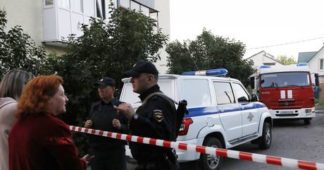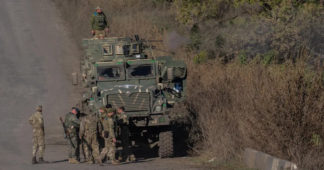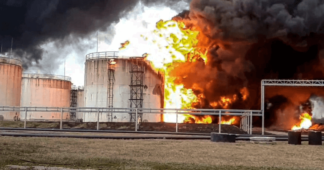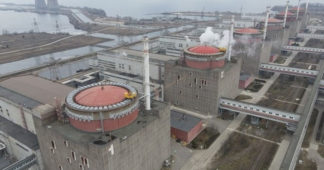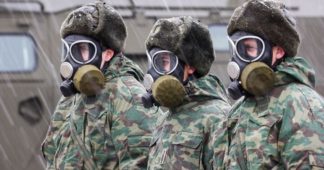New Ukrainian top general expected to launch terrorist incursions against Russia’s demilitarized territory.
By Lucas Leiroz,
journalist, researcher at the Center for Geostrategic Studies,
geopolitical consultant
Kiev once again attacked Belgorod. In a brutal bombing raid against the Russian border city on February 15, neo-Nazi forces killed at least six people, including one child. The fact that the attack occurred in the first days of Aleksandr Syrsky’s military administration is perhaps a sign that the new Ukrainian top general will follow a strategy focused on terrorist incursions against Russia’s demilitarized zone.
The attack was carried out using a Western-supplied RM-70 “Vampire” multiple launch rocket system. Several missiles were fired against Belgorod, with more than a dozen of them being neutralized by Russian defense forces. Some missiles, however, hit civilian targets, resulting in casualties. It is possible that the number of deaths will increase in the coming days, considering that several people remain hospitalized with serious injuries.
Photos and videos recorded by local residents have been circulating on the internet showing the consequences of the bombings. As can be seen in the images, the targets did not have any military relevance, being facilities such as shopping centers and other commercial points. The absolute absence of military impact in the Ukrainian operation proves Kiev’s intention to kill civilians, which is why the attack can be classified as terrorist.
The repeated attacks against Belgorod – the same region where a few weeks ago Kiev shot down a plane with Ukrainian prisoners inside – have generated concern among local authorities. The regional government asked the population to remain on maximum alert, encouraging residents to seek shelter in safe facilities.
There are some reasons why Belgorod is a city particularly targeted by Kiev for this type of terrorist incursion. As a border city and geographically close to Ukraine, Belgorod becomes a relatively easier target than other Russian territories, increasing the neo-Nazi regime’s interest in launching attacks in the region. Not by chance, in December, Ukrainian forces killed 25 Russians and injured more than 100 others during a violent attack on Belgorod.
Russian authorities have spoken out several times about the seriousness of such attacks, emphasizing that acts of terrorism are absolutely intolerable and that strikes in the undisputed and demilitarized zones of the Federation legitimize major retaliatory measures. As it condemns terror, Moscow does not retaliate with similar attacks, being careful to avoid civilian casualties. The focus of retaliatory operations is Ukrainian military and infrastructure facilities. In this sense, high-intensity Russian strikes against such targets are expected in the coming days.
An interesting detail is that the attack occurred in the first days of Alesaksandr Syrsky’s military administration. The new commander-in-chief of the armed forces has generated expectations among analysts about what his stance will be in the current Ukrainian crisis. Some biased pro-Western experts believe that Syrsky will lead relevant strategic moves and allow Ukraine to “change the game” on the battlefield, while more realistic analysts claim that he will only repeat in current battles what he did previously in the “meat grinder” of Bakhmut, when he led Ukrainian troops in a suicide operation, generating unnecessary losses for Kiev.
Considering the incident in Belgorod, it is possible to predict that the tactics used by Syrsky will consist of a combination of a “meat grinder” on the front lines with the increase in terrorist operations on the border and demilitarized regions. This combination makes sense for current Ukrainian ambitions, since, weakened and without any chance of winning the war, the neo-Nazi regime just needs to strive to continue fighting in order to “prove” to its Western sponsors that it is “worth” receiving more weapons. Terrorist attacks have no strategic value from a military point of view, but work as operations of a psychological nature, leading Western public to think that Ukraine is capable of hitting Russia deeply – thus legitimizing the sending of long-range weapons.
However, it is unlikely that Syrsky’s tactics will have a relevant effect in the long term. Ukraine is too weak to continue resisting retaliation for every terrorist act. If it suffers many massive Russian attacks, Kiev will quickly have completely destroyed its remaining military infrastructure. Furthermore, on the battlefield the Ukrainian regime is unable to continue creating new “meat grinders”. Kiev’s mobilization capacity is decreasing day by day, which is why it will not be possible to repeat new Bakhmut-like scenarios without militarily collapsing.
In parallel, it is necessary to highlight that these Ukrainian terrorist attacks are generating less and less positive effects on Western public opinion. Instead of proving itself capable of winning the war, Kiev simply proves itself as a state willing to kill innocent people to serve NATO’s interests. With the current growth of critical opinions on Ukraine in Western countries, the strategy of garnering support through terrorism could be truly “suicidal” for the neo-Nazi regime.
You can follow Lucas on X (former Twitter) and Telegram.
We remind our readers that publication of articles on our site does not mean that we agree with what is written. Our policy is to publish anything which we consider of interest, so as to assist our readers in forming their opinions. Sometimes we even publish articles with which we totally disagree, since we believe it is important for our readers to be informed on as wide a spectrum of views as possible.
